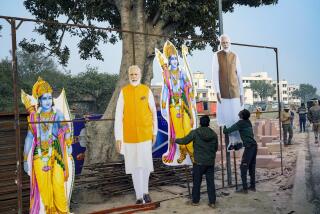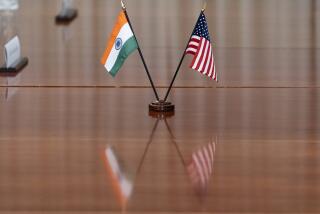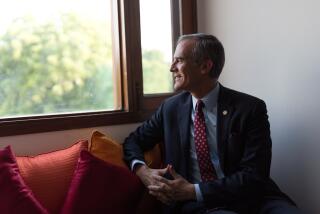Gandhi Honor Pitched Amid Nuke Outrage
- Share via
WASHINGTON — The day after his country shocked the world by conducting three underground nuclear weapon tests this spring, India’s envoy to the United States had the seemingly unenviable task of showing up on Capitol Hill.
But the purpose of the stop by Naresh Chandra was not what one might have suspected, given the outrage that greeted the tests. Instead, the ambassador came to lobby for a proposal to set aside a piece of federal real estate on which to build a memorial to Mohandas K. Gandhi, the apostle of peaceful action and nonviolent protest. The parcel in question is a triangular piece of land directly across the street from the Indian Embassy here.
As Chandra prepared to testify before the House Resources subcommittee on national parks and public lands, talk of India’s nuclear tests and the likelihood that Pakistan would follow suit filled the corridors of Congress--especially given that U.S. intelligence agencies had been caught off guard by the detonations.
But the envoy stayed focused on the task at hand, extolling Gandhi for having led “India’s nonviolent freedom struggle against British rule and against all forms of social and religious discrimination.”
Although aides reported that the ironic timing of Chandra’s appearance was discreetly mentioned, panel members resisted the temptation to publicly remark upon it. The ambassador was courteously received and his appeal duly noted.
A bill seeking authorization for a Gandhi memorial has been kicking around Congress since last year. It was introduced by Rep. Frank Pallone Jr. (D-N.J.), the co-chairman of the House Caucus on India and Indian Americans, whose district includes a high concentration of Americans of Indian origin.
Companion legislation was introduced in the Senate by Sen. Daniel Patrick Moynihan (D-N.Y.), a former U.S. ambassador to India.
Pallone’s hope was to have the memorial erected as part of India’s yearlong celebration of the 50th anniversary of its independence from the British--an observance that began last August. That now appears unlikely, although most observers expect Congress to approve the request.
“The bill has strong bipartisan support, and we think it will be approved easily,” said Pallone spokesman Ted Loud.
He said lawmakers have separated the subject of the controversial nuclear tests from the issue of a memorial to a great world leader, which will be built at no cost to U.S. taxpayers. The Indian government will pick up the tab for the construction of the memorial, after the National Park Service certifies that it meets the criteria for “subjects of lasting historical significance to the American people,” in the language of the bill.
Pallone appeared before the House subcommittee the same day as Chandra.
“It is abundantly clear that the goals and values that Gandhi lived for and died for are entirely consistent with what our nation stands for and believes in,” the congressman said.
Attending the committee hearing was Wajahad Habibullah, minister of community affairs at the Indian Embassy. In a recent interview, he insisted the Gandhi memorial and the nuclear tests “are separate issues.”
“Gandhi’s role as an Indian leader ended in 1947, when he led the country to independence from British rule,” he said. “His role as a world leader continues to this day, and has served to inspire other leaders, such as Martin Luther King Jr. It is even more important today when the world is becoming so much more violent.”
Officials at the Pakistan Embassy refused comment on the memorial request.
More to Read
Sign up for Essential California
The most important California stories and recommendations in your inbox every morning.
You may occasionally receive promotional content from the Los Angeles Times.













